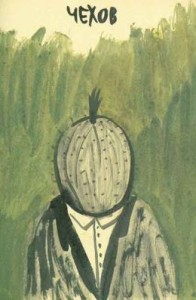Synopsis:
Like The Man in the Case, Gooseberries is also a frame story following Ivanych and Burkin and the stories they share with each other. At the start of Gooseberries, Ivanych and Burkin are caught out in a torrential downpour. They take cover at the home of Alekhin, who despite the midnight hour, welcomes them into his home and invites them to his bathhouse. After the bath, Ivan impulsively runs outside and throws himself in the water, swimming as far as the mill and asking, “Lord have mercy” before returning to shore. Now clean and warm, the trio settles in the drawing room to listen to Ivanych tell a story about his brother Nikolai which had been interrupted earlier by the storm.
Ivan describes the childhood he shared with his brother embracing the “freedom of the countryside…just like peasant children” after their father’s estate was liquidated. Nikolai struggles in his office job and dreams of buying a small property in the country where he can grow gooseberries. Ivan remarks that in society it appears that “if our intelligentsia is drawn to the soil and longs for country places, it’s a good thing”. Nikolai marries an old widow who dies and leaves him some money, with which he finally buys a piece of land on which he “ordered twenty gooseberry bushes, planted them, sat down and began living like a landowner”.
When Ivan finally visits his brother, he finds that Nikolai has become condescending to him and the gooseberries they have with their meal are “sour and unripe”. Nevertheless, they have the “sad thought that [they] had been young once and were now both gray-haired and it was time to die”. Naturally, Nikolai is overjoyed by the berries, which come from his own garden.
Nikolai’s smug happiness makes Ivan think about all the happy people in the world, and he thinks about how “obviously the happy man feels good only because the unhappy bear their burden silently, and without that silence happiness would be impossible”. Since this realization, Ivan has found it unbearable to live in a town “because theres no more painful spectacle for me now than a happy family”. He exclaims that
“There is no happiness and there shouldn’t be, and if there is any meaning and purpose in life, then that meaning and purpose are not at all in our happiness, but in something more intelligent and great. Do good!”
This quote questions the definition and importance of happiness and shows that Ivan is having his own existential crisis about the meaning of life. Unfortunately, his audience is uninterested in these questions, they find it “boring to hear a story about a wretched official who ate gooseberries” and shortly afterwards go to bed.

I think the idea of the unhappy bearing their burden silently in order for the happy man to be happy is particularly relevant this week in light of the riots in Baltimore. The underprivileged African-American community there cannot evoke change through withholding labor or other forms of disagreement and feel that rioting- breaking societal norms and refusing to acquiesce to the system- is the only option left to them. They are forcing the proverbial “happy” people to pay attention.
Milton Mays, recalling Burkin’s pungent pipe at the end of “Gooseberries”, says, “Ivan Ivanych’s story is a ‘bad smell’ in the context in which he tells it, and his ‘truth’ traduces reality”.
Imagining that bad smell, do we believe Ivan’s diatribe about happiness? He certainly bolsters it with a lengthy description of his porcine brother’s vapid existence, but then he undermines his argument with a cop-out: he implores Alekhin and Burkin to “do good!” (319) while lamenting his own old age and inability to do good. Perhaps this is the bad smell wafting at the end of the tale…
Burkin and Alekhin find Ivan’s story quite unsatisfying. The narrator claims that they would rather have heard about more spicy subjects–like women. Unfortunately for them, Ivan may share the stylistic allure of Chekhov, whose literary style (according to Nabokov) “goes to parties clad in its everyday suit.”
I liked how Chekhov plays with the idea of anticipation and disappointment in the opening lines: “you wait for rain, but it does not come” (311). A few lines later it is pouring in torrents, and continues to do so for the rest of the story. This seems to play on the reader’s expectations of how a narration should unfold…
In an academic paper contrasting Katherine Mansfield’s “Bliss” and Chekhov’s “Gooseberries, the author explores fruit symbolism as it pertains to the construction of a false reality.
https://www.nshss.org/media/46389/Eugine.pdf
Chris Power revisits this timeless classic with a review in the Guardian, making a strong case for the act of “rereading” literature again and again:
http://www.theguardian.com/books/booksblog/2013/dec/11/comfort-reading-anton-chekhov-gooseberries
Check out the synopsis for this modern film interpretation of Gooseberries! http://www.imdb.com/title/tt1423376/